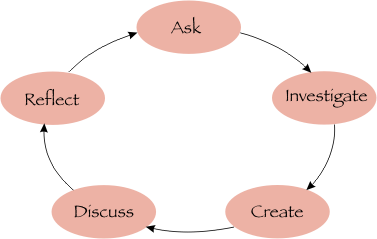Inquiry-based learning
“Inquiry learning is not about memorizing facts - it is about formulation questions and finding appropriate resolutions to questions and issues. Inquiry can be a complex undertaking and it therefore requires dedicated instructional design and support to facilitate that students experience the excitement of solving a task or problem on their own. Carefully designed inquiry learning environments can assist students in the process of transforming information and data into useful knowledge”

- https://chipbruce.net/resources/inquiry-based-learning/defining-inquiry-based-learning/
- https://en.wikipedia.org/wiki/Constructionism_(learning_theory)
- http://edutechwiki.unige.ch/en/Inquiry-based_learning
- Technology-Supported Inquiry-Based Learning A Synthesis for Leveraging Technology to Meet the Needs of Today’s Students
Most versions of inquiry learning see a continuing cycle or spiral of inquiry (Bruner, 1965), one version of which is shown here. This is a model for how people engage in inquiry, such as those proposed for the process of writing or Dewey’s (1933) for thinking. Some such models emphasize immersion in phenomena prior to more focused investigation; this is what Hawkins (1965) calls “messing about”. Others emphasize action growing out of the inquiry. For example, liberatory education (Freire, 1970) conceives two stages, one in which people become aware (conscientized) of their oppression and a second, which builds upon the first, in which they transform that state (praxis).
Drawing from Dewey’s four impulses of the learner in The School and Society; the stages of reflective action from How We Think, and the fundamental idea that learning begins with the curiosity of the learner, we can envision a spiral path of inquiry: asking questions, investigating solutions, creating, discussing our discoveries and experiences, and reflecting on our new-found knowledge, and asking new questions (Bruce & Bishop, 2002).
According to Blumenfeld et al. (1991), in IBL, inquiry-based learning manifests itself through researching and responding to open-ended questions that are generated by the learners themselves. IBL provides students with authentic learning opportunities that motivate students to learn new content, a schema for adding new knowledge to existing knowledge, and an opportunity to actively apply their new knowledge to solving a problem (Edelson, Gordin, & Pea, 1999).
The phrase inquiry-based learning is used to describe a process in which the students (usually under the guidance of a teacher) are“discovering” (possibly “creating”) knowledge themselves by carrying out experiments, by formulating and investigating conjectures, by discussing and sharing with peers both ideas and products – the latter being an important component of the constructionism. Such an approach is relatively new in the context of the mathematics education and has been promoted in Bulgaria mainly since 1984 within the experimental schools of the Research Group on Education (RGE) (Sendova, 2011).
- https://www.literacyworldwide.org/blog/literacy-daily/2014/09/05/rethinking-inquiry-as-a-cycle-of-learning
- http://oer.educ.cam.ac.uk/wiki/Teaching_Approaches/Inquiry
- Inquiry Cycle, as highlighted by Ann P. Bishop and Bertram C. Bruce, which features five actions: Ask, Investigate, Create, Discuss, and Reflect.
Wilensky
Inquiry-based education: A third category is making as inquiry-based educational activity. These programs may or may not be located in spaces outfitted with expensive technologies and tools. For instance, they may take place in classrooms, libraries, museums, after-school or community settings that have been pedagogically transformed into “making settings” as groups of individuals participate side by side or collaboratively in making a range of artifacts while drawing on interdisciplinary tools and modes of inquiry. The goals of these programs are generally to inspire interest, foster engagement, develop understanding of the processes and concepts at the center of making activities, and support students’ identities as thinkers, creators and producers of knowledge. These programs frequently draw upon youth development principles such as developing supportive relationships, building on children’s prior experiences, and supporting leadership, confidence and agency.
